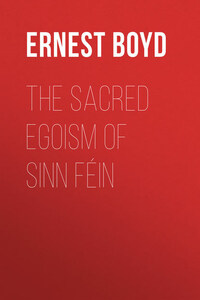In this age of sacred egoisms and oppressed nationalities the drama – or melodrama – of international politics has been enriched by a variety of distressed heroines, in the shape of small nations, whose salvation has inspired professions of altruism slightly incompatible with the previous records of the rescuers as revealed to the impartial observer. The shortage of paper and man-power notwithstanding, the printing presses of the Latin and Anglo-Saxon worlds have poured forth an undiminished stream of most enheartening and uplifting sentiment relating to the rights and virtues of subject races. Prior to August 1914 small nations were happy if they succeeded in escaping the attention of their powerful neighbours, but they have now been raised from the relatively obscure fame conferred upon the more unfortunate by those sympathetic or patronizing friends of liberty who have flourished characteristically in the English-speaking countries. What was once the hobby of select groups of forward-looking Liberals has become the prerogative of their erstwhile opponents, the orthodox imperialists and upholders of predatory patriotism. Indeed, in many instances, the professional gladiators of freedom find themselves deprived of their occupation, since their philosophy of domestic and international politics conflicts seriously with the current official dogmas. The rescuing of small nations has become a “controlled industry,” and appropriate literature is issued in the shape of Blue Books and White Papers, or in the less ostentatious, if equally suspicious, form of inspired press propaganda.
Ireland had long been a subject of melancholy reflection in those quarters devoted to international altruism of a not too personal kind. Even the British Liberal found an occasional tremor in his voice as he contemplated the state of Irish affairs, and remembered his own virtuous conduct of the case for self-government in Ireland. That voice, however, broke into sobs of indignation only when uttering judgments upon the iniquities of men further from home, and his enthusiasm for so proximate a victim of imperialism was checked by the tangible and daily proofs of his own futility, less evident where his plea concerned a more remote beneficiary. Distance lends enchantment to the Liberal view of international politics. For that reason it is natural to find the strongest expressions of commiseration for Ireland outside the precincts of the Island Race, and, in fact, the Irish people have been accustomed to derive considerable satisfaction from the manifestations of good-will which they have received from Continental countries. The sympathetic foreigner, when not an Englishman, is spared the suspicions which his ignorance of the actual facts might have earned for him, for both parties are likely to be at a mutual disadvantage in this respect. Moreover, the claim of a Frenchman, for example, is overwhelmingly reinforced by the knowledge of material assistance rendered, none being so introspective as to question the motive of those historic replies of the French nation to the call of Ireland. In return, did not Ireland alone distinguish herself in 1870 by a far-sighted rejection of Prussianism, at a time when the Hun fought for the recovery of Alsace amidst the plaudits of the politicians, statesmen, and, above all, the moralists of Anglo-Saxondom? When the Irish organized a brigade to assist France against Prussia, the obstructionist and condemnatory attitude of the British Government seemed only further proof that Ireland’s real friends must not be sought in England. These reciprocal manifestations of international appreciation are the definite crystallization of a sentiment confirmed in Ireland by the fact that British and West British scholars have singularized themselves by an indifference and hostility respectively towards the language and civilization of the Irish nation. Continental scholars, on the other hand, have displayed an interest in Gaelic studies which cannot but induce in the Irish people a comforting sense of their own dignity and importance.
Everything, therefore, has combined to give Ireland a belief in her own international identity, and, recollecting her ancient grandeur, she has felt entitled to the sympathy which her subsequent misfortunes have earned amongst all disinterested students of a history by no means negligible in the evolution of European civilization. When the great Allied crusade for the liberation of small nationalities began, and the world resounded to the cries of protest against the tyrants of subject races, the Irish people were touched by this dramatic vindication of their age-long contention. For a brief period the scepticism of centuries made way for a degree of faith sufficient to bring a number of distinguished Nationalists into the ranks of England, and under their impulse Ireland – as distinct from the West Britons – contributed what has remained her military share in the conflict. The “loyalists,” of course, were relieved at the opportunity of exchanging the dubious pleasures of mutiny and gun-running for the more sonorous activities of a war for freedom. Having scotched political self-determination at home, they became seized of a praiseworthy ambition to confer that denied benefit upon the unenlightened foreigner. As for the mere Irish, they gradually realized the symbolism of this loyal gesture, the Ulsterior motive became apparent: the war was on behalf of the small nations, but one had been forgotten. What is one amongst so many, it may be asked? But the Irish could not rise to that level of almost divine impartiality which is the natural sphere of the Britisher when he has decided to right a wrong. The relative importance of Ireland could not be as apparent to an Irishman as to his benevolent conqueror.








